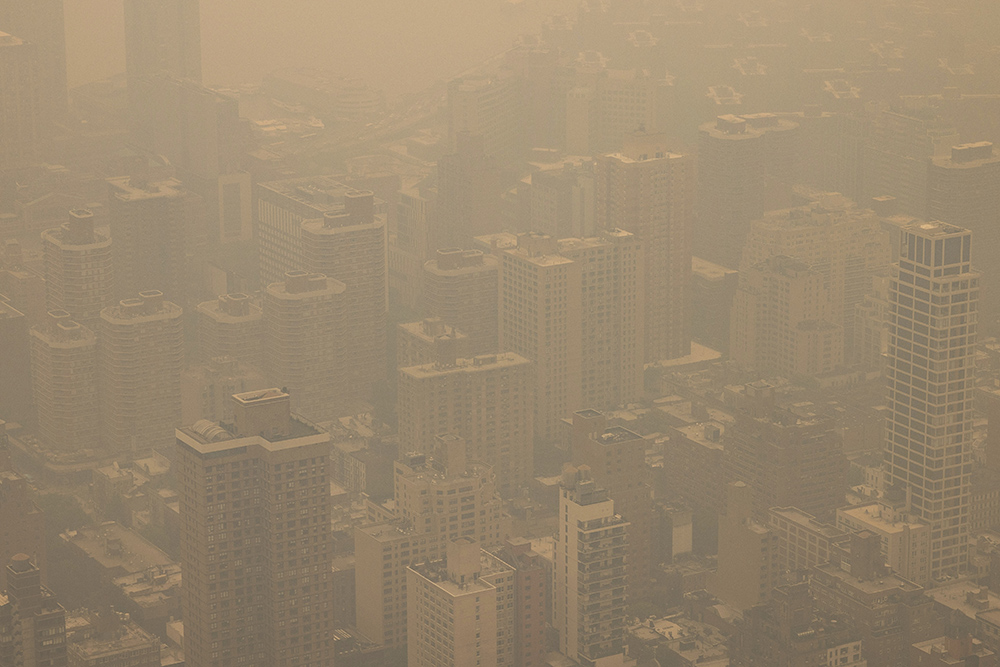
In a view from the Empire State Building observatory June 7, New York City is engulfed in a haze of thick, smoky air from Canadian wildfires. (AP/Yuki Iwamura, File)
Orange is the color of caution, from traffic cones to flashing lights to a variety of signs that warn of hazards ahead. And on June 7 across the Northeastern corner of the United States — particularly in New York City — orange was the color of the sky.
Not the warm, soft, sherbet orange-yellow-pink of the sunsets known to predict smooth sailing, but rather the blunt, shocking, unnatural red-orange that indicates a lack of safety.
The sky screamed: Beware. Something is wrong.
Hazardous air quality — caused on the East Coast that week by unseasonably severe wildfires in Canada — is something Catholics must care about year round, not just when it affects a major U.S. city where many media offices reside.
That random Wednesday was one of the few times when a place that is responsible for an exorbitant amount of climate change-causing greenhouse gas emissions was met just as significantly with the environmental and human health effects of releasing so much carbon into the atmosphere — New York is the U.S. city with the highest carbon footprint, and ranks as the city with the third-highest carbon footprint worldwide, according to the Global Gridded Model of Carbon Footprints.
Advertisement
The industrialized West is usually pretty apt at exporting those types of undesirable side effects of production and convenience to be felt by less developed nations. As sociologist Andrew Jorgenson was quoted as saying in a recent essay for NCR's EarthBeat, "Throughout human history, more powerful societies and nation-states have utilized their geopolitical-economic power to create and maintain ecologically unequal exchanges with less powerful and less developed societies and countries."
Theologian Daniel Castillo calls it "a perennial injustice present within human history."
While New York City that day experienced one of the worst air quality indexes on record worldwide, the city is typically not one that sees air quality index readings that pose medical threats to healthy people, something the World Health Organization says affects more than 90% of Earth's population.
"Some forms of pollution are part of people's daily experience," bemoaned Pope Francis in his 2015 encyclical, "Laudato Si', on Care for Our Common Home." He continued, "Exposure to atmospheric pollutants produces a broad spectrum of health hazards, especially for the poor, and causes millions of premature deaths."
A study in The Lancet last year said that number specifically is 6.5 million deaths annually attributed to air pollution.
What happens in one part of the world can and is affecting everyone and everything else.
"We're locked into this economic model, which is focused obsessively on short-term gain, on the gross domestic product," Philip Landrigan, director of the Global Public Health Program and Global Pollution Observatory at Boston College, told NCR environment correspondent Brian Roewe for EarthBeat. "We ignore natural capital, the ecosystems. We ignore human capital, people. We just burn through natural resources, we burn through people with the goal of creating ever-greater profit margins."
While the source of the poor air quality that plagued New York in early June wasn't directly from burning fossil fuels, it came from wildfires. And science now confirms that the more intensely hot, dry and windy conditions that ignite and stoke such flames are tied to climate changes caused by human activity.
Caution. Something isn't right.
As Francis so often says, "Everything is interconnected." The causes and the effects of climate change do not respect economic districts or international borders. What happens in one part of the world can and is affecting everyone and everything else.
Francis and the teachings of the Catholic Church ask us to consider the impact of our choices on those most in need of protection. We are called to care about God's creation — human and non — even when New York's skyline does not look like a caution sign warning of suffocation risks.
Catholics: Pay attention. Look around. We have work to do.



